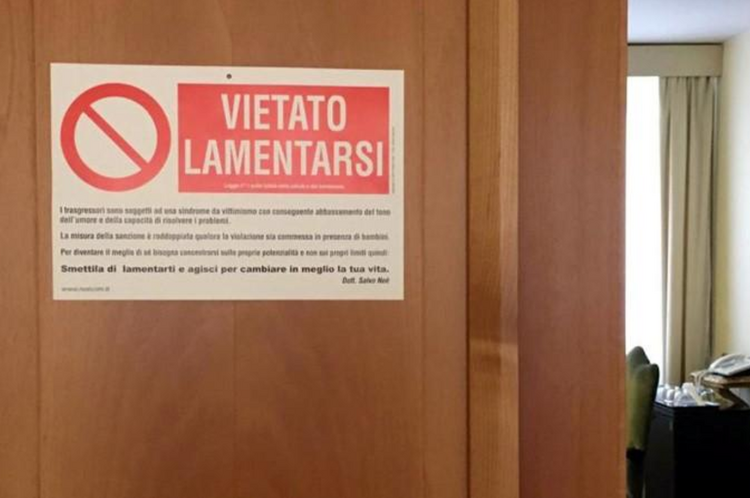Pope Francis left a not-so-subtle message outside his office in the Domus Sanctae Marthae residence: anyone who is thinking of making a fuss, leave your whining at the door.
Italian journalist Andrea Tornielli published a photo on Vatican Insider of a sign posted on the pope’s door with the words, “No whining.”
The sign warns potential complainers that “offenders are subject to a victim mentality” that decreases one’s sense of humor and ability to solve problems.
“The penalty is doubled if the violation takes place in the presence of children. To get the best out of yourself, concentrate on your potential and not on your limitations. Stop complaining and take steps to improve your life,” the sign reads.
While it may seem like a serious request, the pope found the sign hilarious when it was given to him by Italian life coach and motivational speaker, Dr. Salvo Noe.
On his official website, Noe posted pictures of his brief encounter with the pope after a June 14 general audience in St. Peter’s Square. One picture shows Pope Francis cracking up when presented with the sign.
“The expression (Pope Francis) made when presented with the ‘No whining’ sign was beautiful,” Noe wrote on his website.
The sign and a bracelet that reads “Stop complaining,” are part of promotional campaign for his new book of the same name.
According to Tornielli, the pope said he told Noe he “would put it outside my office door where I receive people.” True to his word, the pope reportedly showed an elderly priest who was visiting the sign’s humorous warning to bellyachers. The priest asked and received permission form the pope to share the picture.
The pope has on several occasions warned about the more serious repercussions of complaining which can blind people’s view of Jesus’ presence in tough situations.
Celebrating morning Mass April 3 with staff members from the Domus Romana Sacerdotalis, a nearby residence and guesthouse for clergy, the pope said that “many times when difficult things happen, including when we are visited by the cross, we run the risk of closing ourselves off in complaints.”
Complaining and griping — about others and about things in one’s own life — are harmful, he said, “because it dashes hope. Don’t get into this game of a life of complaints.”
However, the pope has also said that “complaining to God” in moments of doubt and fear — like Abraham did– can be a form of prayer that requires the courage to hope beyond all hope.
“I won’t say that Abraham loses patience, but he complains to the Lord. This is what we learn from our father Abraham: complaining to the Lord is a form of prayer,” the pope said Dec. 28 during his weekly general audience.
“Sometimes I hear confessions where people say, ‘I complained to the Lord.’ But no. (Continue) to complain; he is a father and this is a form of prayer. Complain to the Lord, this is good.”









